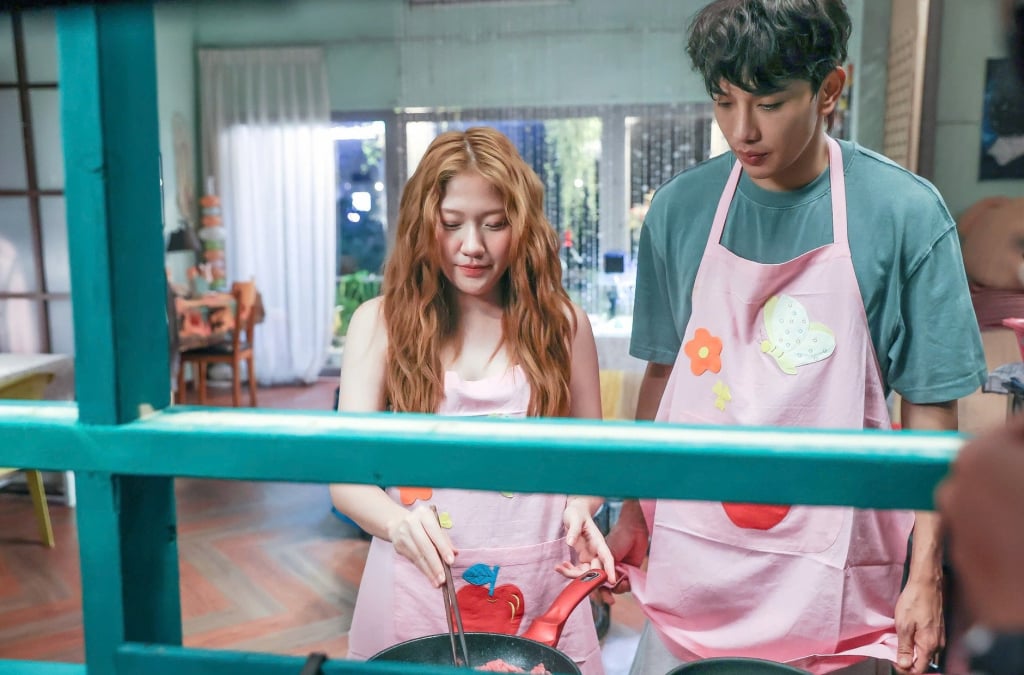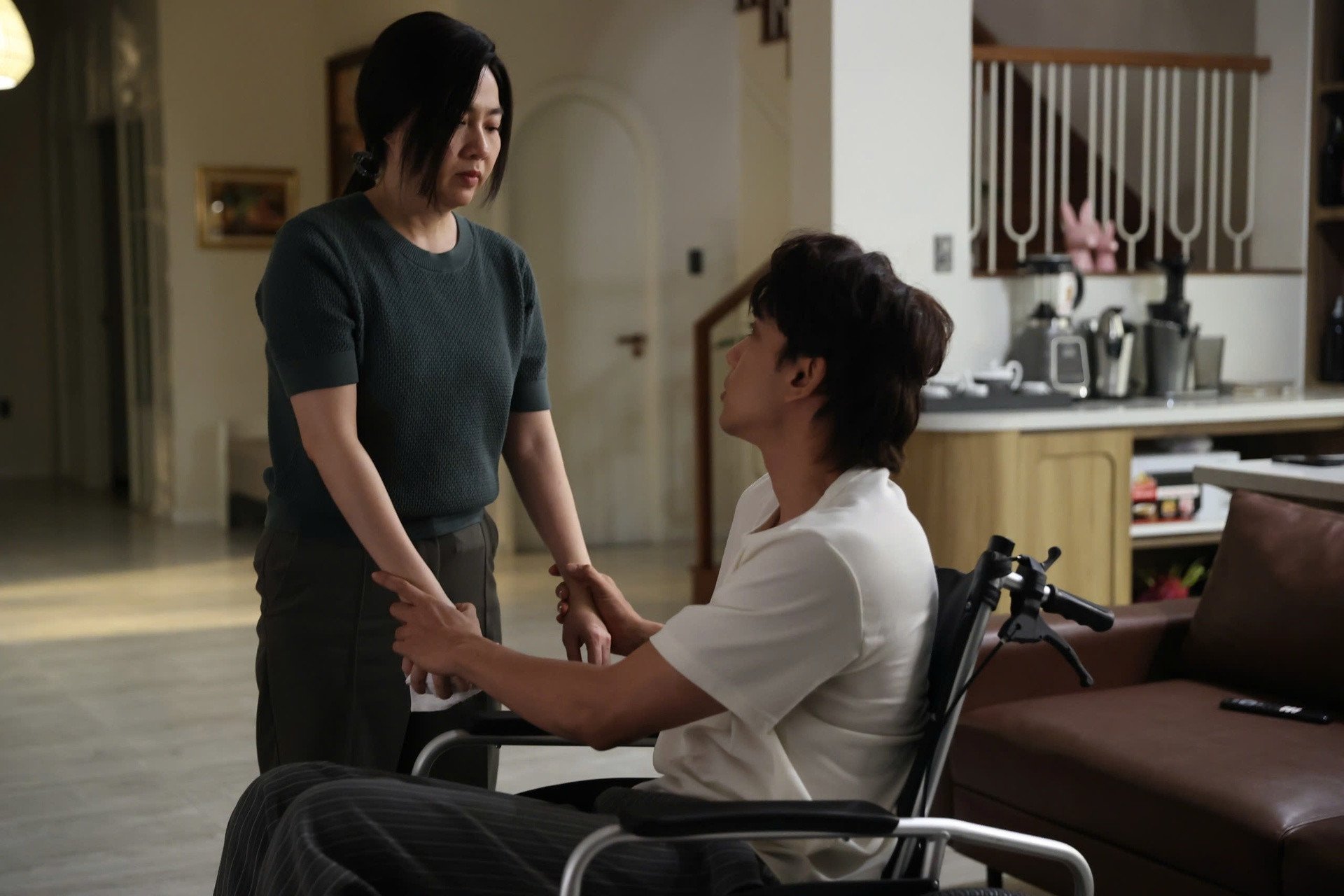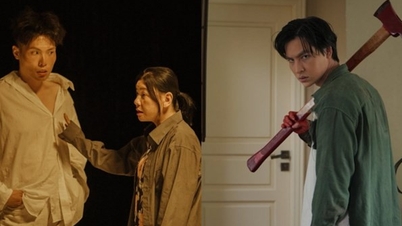At the age of 50, Vu Thanh Vinh surprised everyone by turning himself into a “rookie” when he turned to the film industry. The director confided that he was not afraid of doubts, because this is a challenging land, where he longs to conquer the audience with his own stories and experiences, and is also a way to satisfy his passion for the profession after many years of being busy with TV game shows.
After Two Salts, Vu Thanh Vinh once again tries his hand at family love, a familiar topic but also a challenging one. How to turn familiar ingredients into attractive dishes for movie theater customers is a huge pressure weighing heavily on the shoulders of the director from Soc Trang .
With the sincerity of his artistic ego nurtured from a poor childhood, he chose to approach this topic with a simple, sincere story. I help you up when you fall , maybe that's why, even though she's still immature and clumsy, she still makes a good impression.
The touch of intimacy
The story of I lift you up when you fall follows the footsteps of two orphaned sisters Thuong (Le Khanh) and Luc (Thuan Nguyen). Growing up in poverty, Thuong is still brave and determined to change her fate. After becoming successful, she wants her younger brother to follow the path she "prepared". But unexpectedly, that imposition is the source of conflict, pushing the two sisters apart.
Script I lift you up when you fall Developed by the Binh Bong Bot team - behind the success of Mai , the second most popular Vietnamese film of all time. The film's creative team clearly shows their understanding of audience tastes, when they know how to select subtle slices of life to build family relationships, helping them appear familiar, close, and easily create sympathy.
The team of screenwriters cleverly took advantage of contrasting elements to create two opposing personalities: Sisters Thuong and Luc both grew up from a lost childhood, but each of them had completely different attitudes towards life when they grew up. Thuong was smart, independent, and principled, but forced herself into a cage of “responsibility”. She was both busy with work and taking care of and solving problems for her younger brother, not to mention having a boyfriend with too many demands.

As for Luc, he longed for freedom, wanting to do what he wanted without needing the approval of his demanding older sister. The more Thuong protected and forced her younger brother to follow the path she chose, the more Luc tried to struggle and escape from that toxic control. Here, a contradiction arose: The older sister's love became an imposition, while the younger brother's desire for freedom suddenly turned into an antagonistic reaction.
This tragedy dealt a heavy blow to their seemingly close relationship. The natural construction makes the story realistic, reflecting the conflicts that any family can encounter.
It is worth noting that the writer and director do not try to beautify family relationships, or point the finger of attack at anyone. The characters all have their own problems. They stumble, make mistakes, and then learn to grow, learn to accept and understand.
Thuong is rich and successful but not happy. What she needs is to learn how to convey love properly, to give Luc the right to stumble and make mistakes, instead of insisting on following the path that she believes is the only one that leads to success. That is also the way for Thuong to free herself mentally and psychologically - that is when she truly finds happiness.
As for Luc, what he needs is to learn to be independent and responsible for his own thoughts and preferences. Living with the frustration of feeling controlled, along with the growing existential crisis after the accident that left him paralyzed, Luc needs to learn to accept himself and accept love positively to heal himself.
Vu Thanh Vinh progresses
Vu Thanh Vinh, in this comeback, shows encouraging progress compared to his first film project. Hai Muoi . He tells the story more smoothly despite speeding up the pace, sometimes showing his youthful personality by inserting some details and witty, "trendy" dialogues. That's why I lift you up when you fall not sink in the heaviness of tragedy.

The film's rhythm is relatively harmonious, from the two sisters' eventful childhood to their adulthood, with unexpected turns in life. The appearance of the characters Hai Au (Uyen An) and Doctor Truong (Quoc Truong) adds important pieces, on the other hand, is a test that makes the picture of family love multi-dimensional, with many new spices.
In particular, the scene of the parents' death anniversary meal, which is also Luc's birthday party, where the family of four gathers, becomes a climax with many emotions. The tit-for-tat exchanges between the two sides, along with the past secrets being exposed, push the already tense story to new conflicts.
Placed next to many works of the same theme in the area, I lift you up when you fall There are different choices when there is no need to exaggerate the loneliness of each individual, or outline the emotional range too large to create an impression. Instead, Vu Thanh Vinh's brainchild borrows familiar elements, from family traditions, death anniversary meals, childhood memories to create depth for the love story. This is also the Vietnamese quality of the film, expressed in the resonance between family responsibility, kinship love in a toxic form, where personal elements tend to be neglected, immersed in silence...
Unlike the narrative of many Western films, where the individual ego is often glorified, I lift you up when you fall Focusing on the collective context, the invisible norms and pressures that family members face, this discovery makes the film more sympathetic, despite some limitations and gaps in the story line.
Vu Thanh Vinh's progress is also shown in more effective editing, from cleverly inserted flashbacks to the silence between climaxes, giving the audience space to reflect.

The film also scores points in terms of setting the scene, and in the arrangement of images with clear contrasts, highlighting many of the settings throughout the film. The contrast between the traditional incense village and the modern urban space is both a backdrop for the story and a metaphor for the gap between memory and the present, where love is tested by tragedies that appear in many forms.
Unfortunately, Vu Thanh Vinh's film, despite its clear highlights, lost steam in terms of revenue compared to its predecessor. Two Salts released last year. The work just opened with more than 6 billion VND - the number is probably difficult to meet the production team's expectations.
Amidst the fierce competition of entertainment-themed movies with diverse genres, from horror, action, comedy to animation, the audience's access to I lift you up when you fall accidentally narrowed. The film probably needs more effective promotion and communication campaigns to increase its chances of reaching the public.
Vu Thanh Vinh shared that after nearly 30 years working in television, if he did not make movies, he would still live well. But movies are a challenge that he has longed to conquer, a dream that he has cherished for many years and wanted to realize. So even though he knows that the playing field is harsh, the Soc Trang-born filmmaker still wants to challenge himself.
Source: https://baoquangninh.vn/tiec-cho-chi-nga-em-nang-3378995.html



![[Photo] Prime Minister Pham Minh Chinh chairs the 16th meeting of the National Steering Committee on combating illegal fishing.](https://vphoto.vietnam.vn/thumb/1200x675/vietnam/resource/IMAGE/2025/10/07/1759848378556_dsc-9253-jpg.webp)























![[Photo] Super harvest moon shines brightly on Mid-Autumn Festival night around the world](https://vphoto.vietnam.vn/thumb/1200x675/vietnam/resource/IMAGE/2025/10/07/1759816565798_1759814567021-jpg.webp)








































































Comment (0)